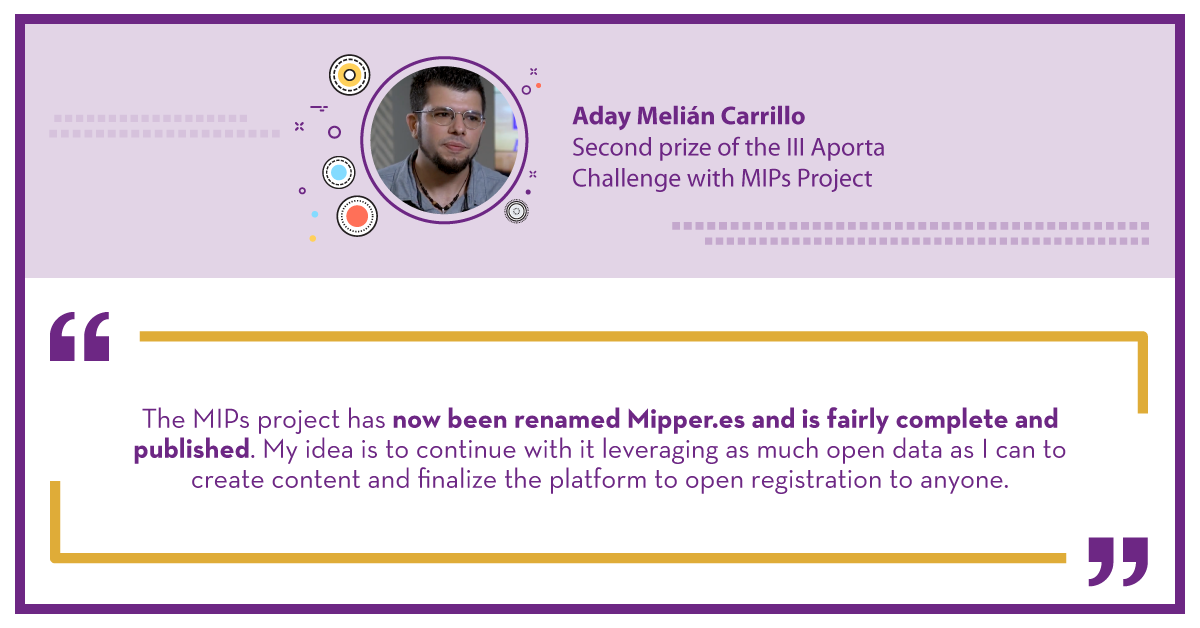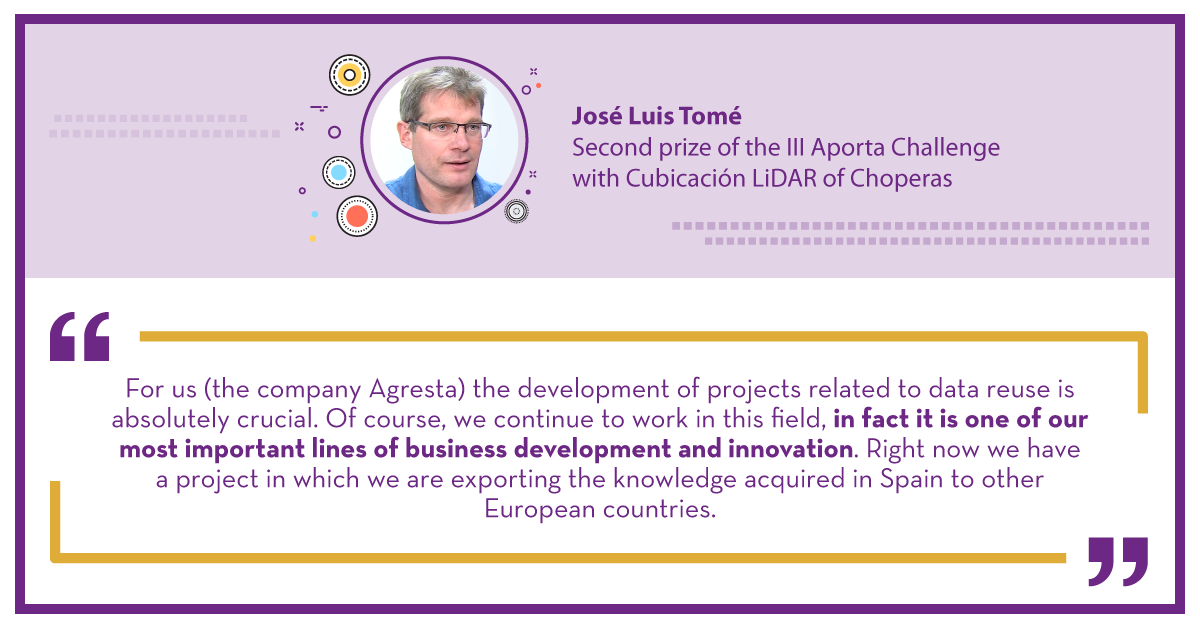On March 5, communities around the world will join together to celebrate Open Data Day 2022. It is an annual celebration that seeks to showcase the benefits and encourage the adoption of open data policies in governments, businesses and civil society.
Throughout the day -and on upcoming dates- local groups from all corners of the world organize different actions related to the publication and reuse of data. In Spain, some activities are also being held, such as:
DATATHON 2022
- Date: From March 4 to April 30, 2022.
- Format: Online
- Organizers: University of Alicante, Miguel Hernández University, PAGODA, Dades Valencia, Cátedra Transició energética, Catedrades, Valencian Government, Polytechnic University of Valencia, University of Valencia, ACICOM and MESURA.
The Datathon 2022 kicks off on March 4, in which participants will have to use machine learning, artificial intelligence or data science tools to respond to a challenge of their choice related to the following fields:
A) Responsible production and consumption.
B) Environmental aspects (agriculture, waste, energy transition...).
C) Culture.
This is a free event. All natural persons of legal age can participate, in teams of 2 to 6 people. It is necessary to register before March 4 through eventbritte.
Prizes will be awarded in two categories: undergraduate students (€750 for each challenge) and master's, doctoral and corporate students (€500 for each challenge). In addition, in both categories, three runners-up prizes of €350 will be awarded to the winners of each challenge.
The competition will be accompanied by various informative sessions and workshops aimed at participants, which will take place throughout the competition (from March 4 to April 30, 2022). Some examples of these workshops are: "How to request information from the administration and legality of data use", "Data mining and visualization" or "Telling stories with data".
Open Data Day 2022
- Date: 4-8 March 2022.
- Format: Face-to-face and online.
- Organizers: Government of Catalonia.
The Open Government Secretariat of the Government of Catalonia also joins the celebration of the International Open Data Day, with activities from March 4 to 8.
- March 4, at 9:30 am (fase-to-face and online). The value of open data. The day will be dedicated to open data reusers. There will be a round table with experts in the field of reuse and two documents of interest will be presented: the new volume of the Open Government collection, "The value of open data and use cases", by the consultant Alícia León Molina, which collects examples of use related to open data in different countries, and the III report on data reuse prepared by the COTEC Foundation. It will be broadcasted via youtube.
- March 7, at 10h (online). Open Science and Citizen Science. Monday will be dedicated to the use of open data in the world of research. The Directorate General for Research will present CORA - Catalan Open Research and experiences from the private sector will be presented by Ideas for Change.
- March 8, at 13:30h (online): What can be the role of local governments in an emerging data economy? Representatives from the city of Rennes, France, and Catalonia will explain the RUDI data Rennes project, led by Rennes Métropole and funded by the European Union: a "social data network". This event will be held in English and French.
Open Data Day 2022: For a more effective reuse of open data
- Date: March 9, 2022, 17h
- Format: Face-to-face
- Organizers: Open Data Barcelona Initiative
Just two years after its last face-to-face event, Open Data Barcelona Initiative brings back the "face-to-face" meetings with a conference aimed at disseminating knowledge and experiences about public open data and its reuse. The evento will last from 5pm to 7pm and will be structured around two round tables:
- Opportunities linked to open data in institutions, where the new features of institutional data portals will be discussed, highlighting the datasets offered and the new functionalities that boost their reuse.
- Projects based on the reuse of open data, focusing on how to use such data in a project, highlighting its potential as a source of knowledge to solve the challenges faced by various groups.
The event is free of charge, but prior registration is required.
Other international events
In addition to the activities held in our country, events are also taking place in other parts of the world, some of which can be followed online.
For example, New York City celebrates from March 5 to 13, 2022 its Open Data Week, organized by the Office of Data Analytics of the New York City Mayor's Office and BetaNYC. This celebration occurs each year to coincide not only with Open Data Day, but also with the New York City Open Data Act, which was enacted on March 7, 2012. This year, NY Open Data Week is being celebrated in a hybrid format with both in-person and online activities. All activities are directly related to publicly available open data about New York.
Another example of an online event is the OSM Africa March Mapathon: Map Sierra Leone, an initiative that seeks to support the development of the OpenStreetMap community in Africa.
If you want to know about other activities that will be held on the occasion of Open Data Day 2022, you can visit their website.
Technology is now an essential component of our daily lives. It is no secret that a large number of companies worldwide have been making significant investments in order to digitize their processes, products or services and thus offer greater innovation in them.
All this has led to an increase in the demand for technological profiles related to the data field by companies, organizations and institutions at an international level. However, in the current labour market this type of profile is not as abundant as the demand. This situation has also been exacerbated by the current health pandemic.
Hackathons: a new formula for attracting quality talent
One of the mechanisms that is gaining popularity to try to increase the recruitment of talent within the technological field are hackathons. These are data-related competitions or challenges whose main objective is to find solutions to real problems.
Hackathons offer the possibility for participants to test their knowledge and for companies to recruit talent for their teams. In fact, these challenges offer some advantages for companies looking to recruit new professionals by allowing them to:
- Observe how participants work
- Interact with them in a more relaxed environment
- Shorten selection process times
Some examples of company-driven hackathons
This mechanism is already used by companies around the world, even for several years. In Spain we find some examples such as the ‘Súper Hackathon BBVA’, whose objective was to find the best young engineering talent, while offering participants the opportunity to learn how to work within a large bank. Another example is the ‘KPMG Talent Hackathon’, whose challenge allowed the company to position itself as an employer brand among STEM students.
Also noteworthy is the ‘Hackathon FACSA Castellón’, an event that is held annually and whose objective is to seek the development of qualified talent, entrepreneurship and the promotion of a technological ecosystem that turns Castellón into a benchmark for innovation. In addition, this challenge symbolizes the collaboration between all the driving companies (Nayar Systems, Cuatroochenta, IoTsens and Eventscase) that support the initiative of the Association of Technology Companies of Castellón, Xarxatec. Among other advantages, this hackathon offers participants the possibility of accessing a job bank, allowing companies to attract talent, as well as promoting collaboration and teamwork.
Popular Internet hackathon platforms to recruit new professionals
These processes do not always have to be face-to-face. On the Internet we can find numerous platforms that offer coding challenges that put companies looking to attract talent in contact with users interested in showing their skills to technology companies and thus get a job opportunity. These tools allow companies of various sizes to have the opportunity to organize this type of competition, and broaden the geographic spectrum of the search, making it easier for candidates from different locations to compete on equal terms.
Here are some examples of these platforms:

Kaggle
Kaggle is one of the best-known platforms among developers. Focused mainly on learning through play (a technique known as gamification), it also offers companies a space for attracting talent. Some of the companies that have taken advantage of its benefits are Banco Santander, Facebook or Yelp.
You have more information in this previous article about Kaggle, where the gamification platforms DrivenData, Devpost, Innocentive and CrowdAnalytix.
HackerRank
It offers challenges for both home users who want to practice their coding skills and prepare for job interviews, as well as organizations looking to identify and hire new developers. Users of this platform can use Python, Java, JavaScript, PHP, C++ or SQL to solve the challenges presented from the instructions provided.
To learn more about this platform, in this article published by The House of Codes you can consult the top 50 challenges found in HackerRank.
Coderbyte
This application is dedicated to helping people solve problems at an industrial level. Like the previous platform, it offers a section for developers to prepare technically for future job interviews, and another one dedicated to companies that want to interview, evaluate and select candidates.
One of the main advantages of Coderbyte is that it presents challenges adapted to the needs of the main brands with which it collaborates, such as Google, HBO or PWC, among others.
CodinGame
Can you imagine being able to get a job through a gaming environment? This platform offers developers the possibility to solve programming challenges through a gamified experience. CodinGame features high-level algorithms and coders that offer solutions to both novice and expert developers.
In addition, it has a dedicated area exclusively for companies wishing to find the best developers thanks to its online coding tests.
Codewars
This platform allows developers to improve their skills through small coding exercises called 'katas'. One of its most outstanding qualities is the large number of languages available through which it allows challenges to be performed.
Qualified is Codewars' partner platform dedicated to organizations wishing to recruit new talent through its platform. Thanks to it, companies can benefit from its technical skills assessments to find professionals that fit their needs.
HackerEarth
This well-known platform not only presents coding challenges, but also hackathons and various kinds of competitions. Did you know that many of the challenges found on this platform can be asked in any job interview related to this field? This is because one of the services offered by HackerEarth is the proposal of recruitment solutions to top-tier technology companies.
In short, more and more companies, organizations and platforms are showing interest in participating and creating this type of challenge to achieve two main objectives: to attract talent and to increase the training and knowledge of their users.
It is also worth mentioning the European Hackathon Manager project, a tool for organising and coordinating this type of event. This tool has recently been tested by Aragón Open Data.
This has been just a small selection of platforms, but if you know of more platforms that may be of interest to our community, do not hesitate to write to us at dinamizacion@datos.gob.es.
Content prepared by the datos.gob.es team.
Hackathons, contests or challenges related to data are a different way to test your ideas and/or knowledge, while acquiring new skills. Through this type of competition, solutions to real problems are sought, often in multidisciplinary teams that share diverse knowledge and points of view. In addition to being divnamic and entertaining, they are a great opportunity to give visibility to your work or solution, expand contacts or improve your position in the job market.
Now that the registration period for the IV Aporta Challenge, we wanted to ask the winners of the previous editions how their experience was and what it brought them on a personal and professional level.
From ideas to viable businesses
So far, three Aporta Challenges have been completed, focused on the field of public administration, the agri-food, forestry and rural sector and the digital education, respectively.
The projects presented in the different editions have been very diverse: from master's thesis or research team projects to prototypes of already consolidated companies or ideas that have ended up becoming viable businesses. It is the case of Light, the winner of the first edition of the Challenge, in 2017. Light is an app that encourages people to be more sustainable in their daily lives through gamification, using data from Smart cities. After the Challenge, its creators continued working on the project, developing its business model.
Agesta, for its part, a company already consolidated before the Challenge, which took over the second prize of the II edition with a web system aimed at estimating the volume of poplars on a local scale. Agresta continues to develop highly successful projects both nationally and internationally.
Another example is UniversiDATA-lab, the winning solution in the third edition, whose final was held last summer. It is a public portal for advanced and automatic analysis of datasets published by universities. Also the second prize of this edition, the IPM project, continues to run after the Challenge is over.


Promotion of the labor profile in the market
In many other cases, the Challenge served as a platform to gain visibility and broaden the curriculum, which was influential in attracting the attention of various companies and institutions. This situation has left many creators without time to continue developing the solution presented in the Challenge -although they do not rule out taking it up again in the future-, but it has given them great possibilities for the future.

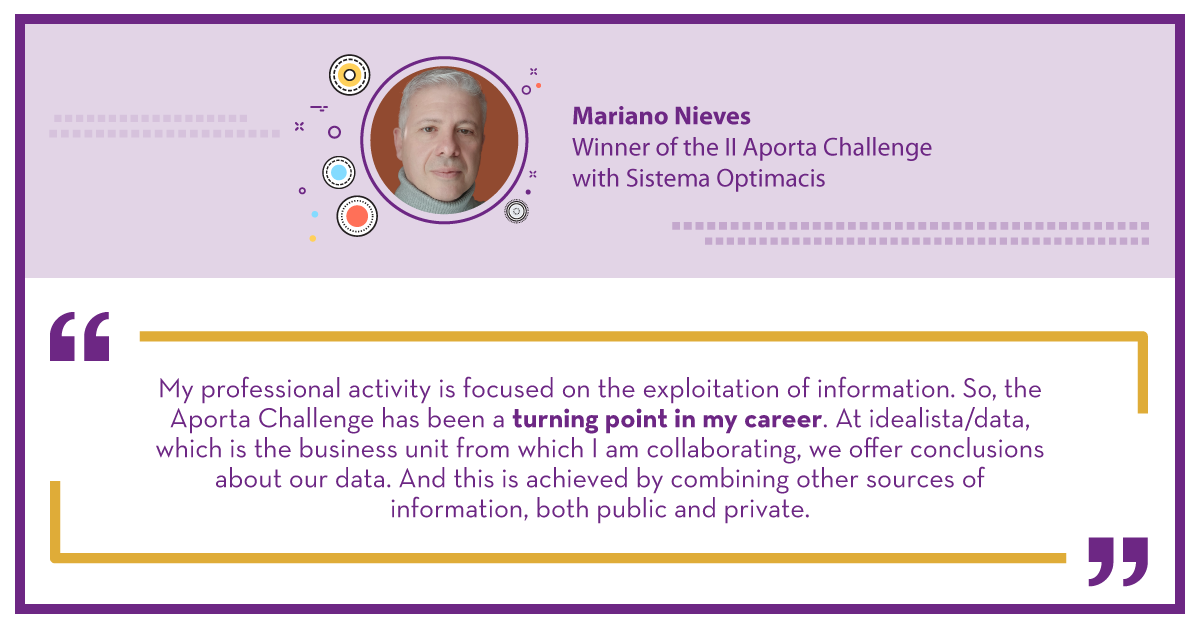

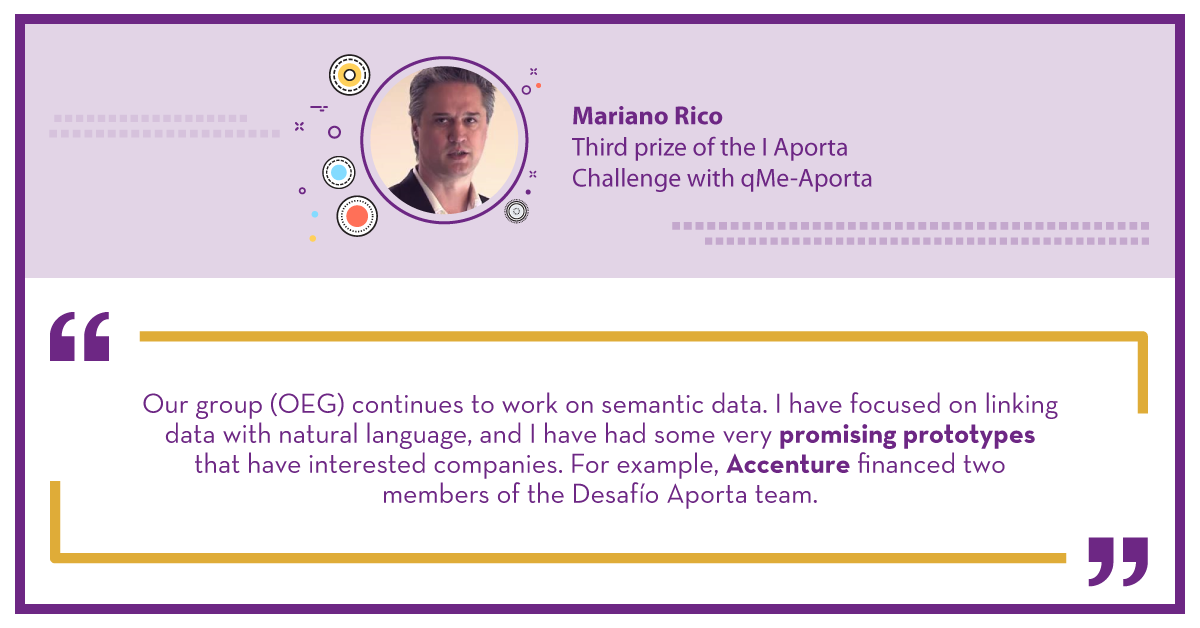
The experience of participating in the Aporta Challenge
But if there is something that the participants in the previous challenges stand out, it is the experience they acquired. The Aporta Challenge was an opportunity to shape an idea and develop a data project from scratch.

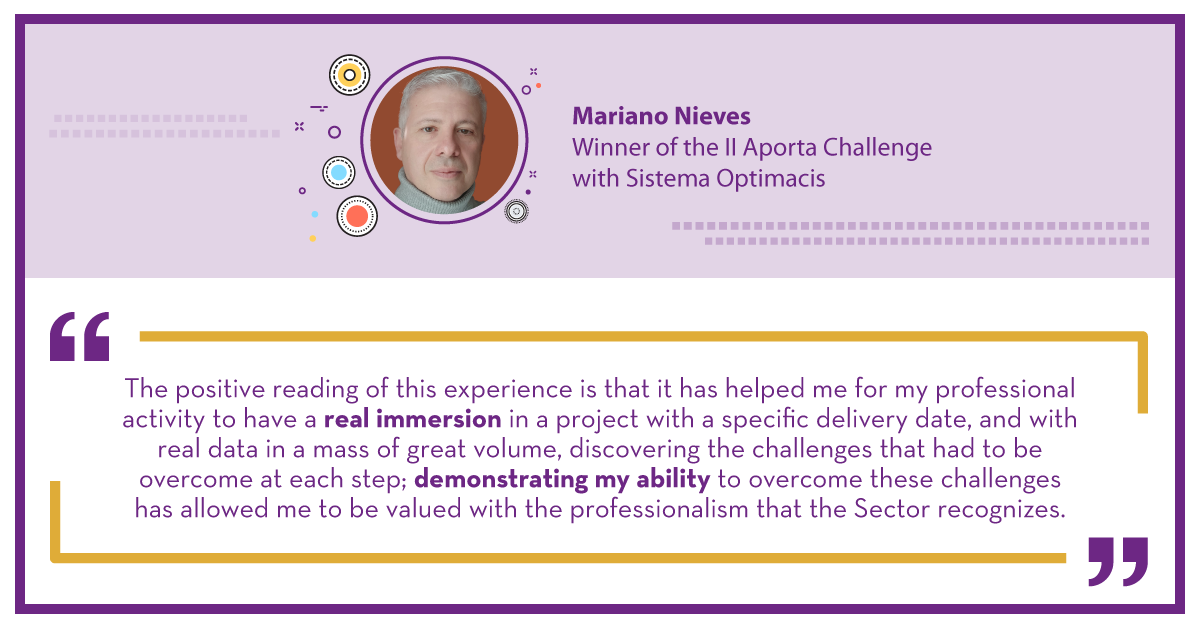
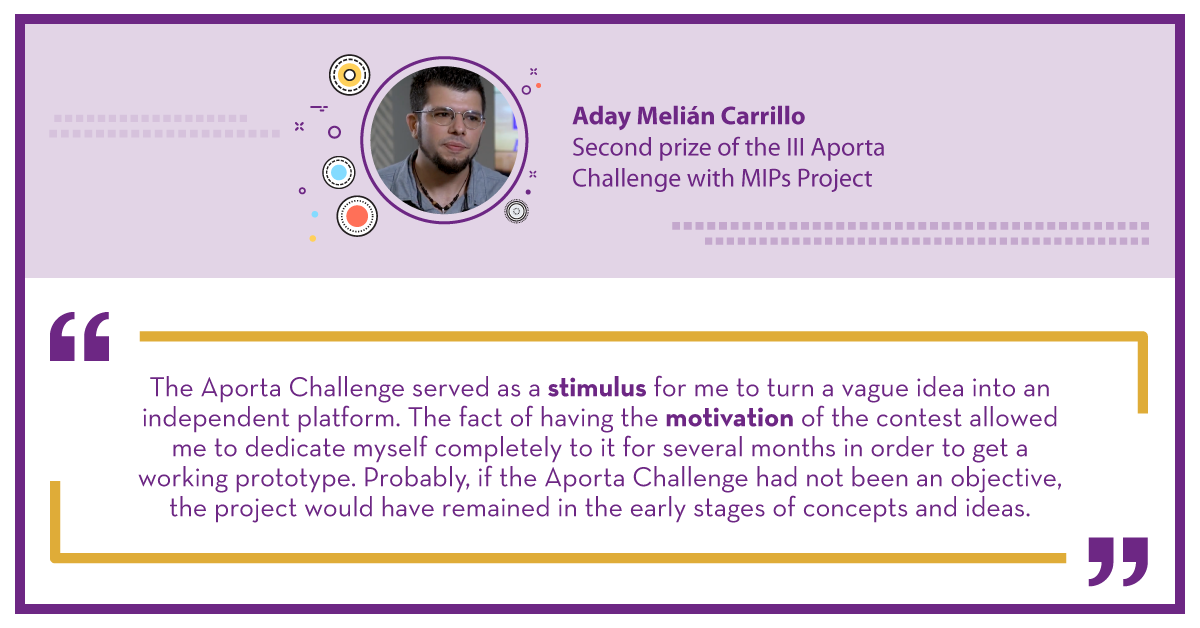

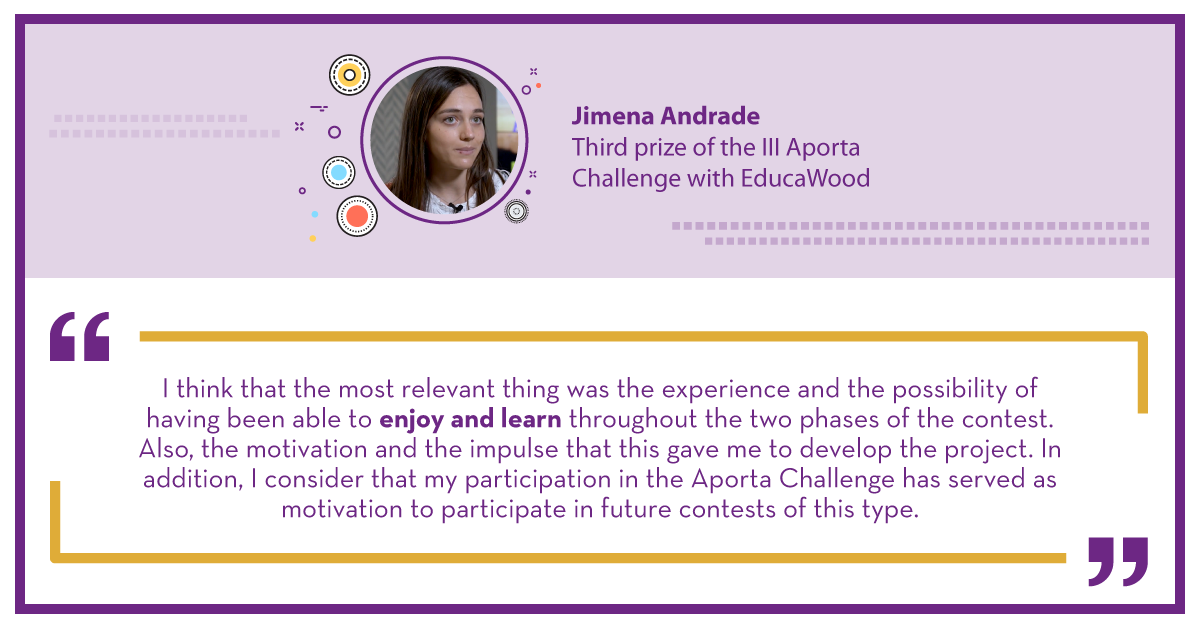

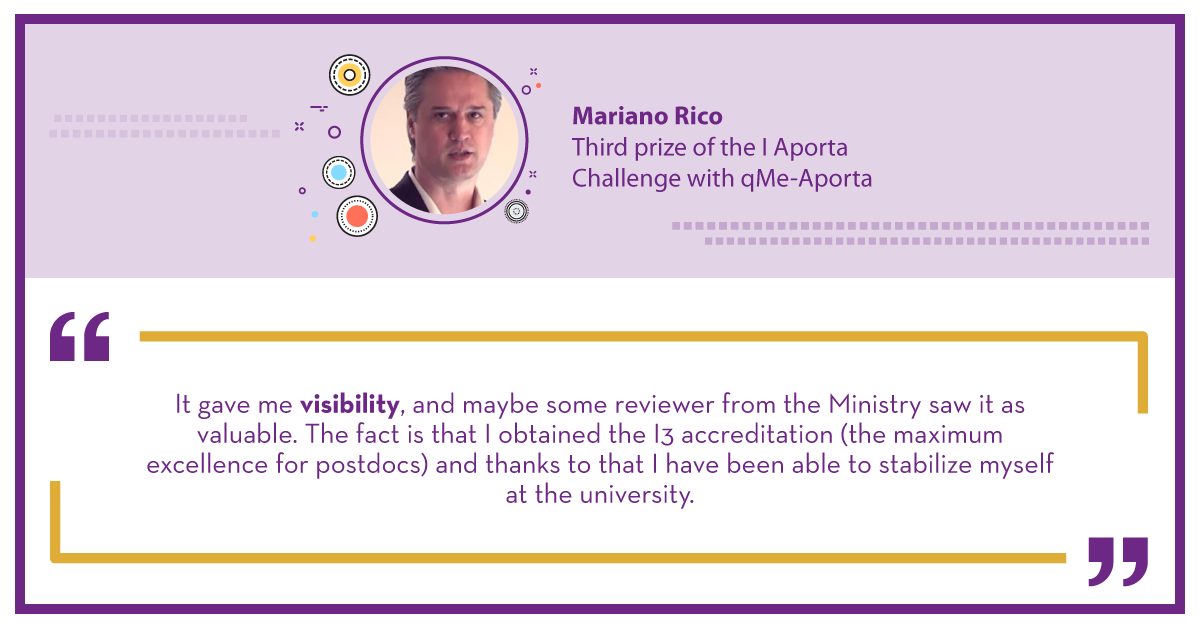
Do you want to participate in the new edition? The term is open until February 15
If you want to follow in the footsteps of the winners of the Aporta Challenge, we inform you that the fourth edition is still open. In this case it seek ideas for solutions aimed at driving improvements in the field of health and wellness, that use open data in their development.
To participate, you just have to fill out the form on the Electronic headquarters of Red.es, indicating what your idea is and its value to society, as well as the data sources you would use. You will also have to upload a video explaining the idea.
You have all the information in our web and in the challenge rules.
Go ahead and put your talent to the test!
Content prepared by the datos.gob.es team.
On November 2, the awards ceremony took place for the winners of the V edition of the Castilla y León Open Data Contest. This competition, organized by the Ministry of Transparency, Spatial Planning and Foreign Action of the Junta de Castilla y León, recognizes the realization of projects that provide ideas, studies, services, websites or mobile applications, using for this datasets from this Open Data Portal.
The event had the participation of Francisco Igea, Vice President of the Junta de Castilla y León, and Joaquín Meseguer, General Director of Transparency and Good Governance of the same, in charge of awarding the awards to the winners.
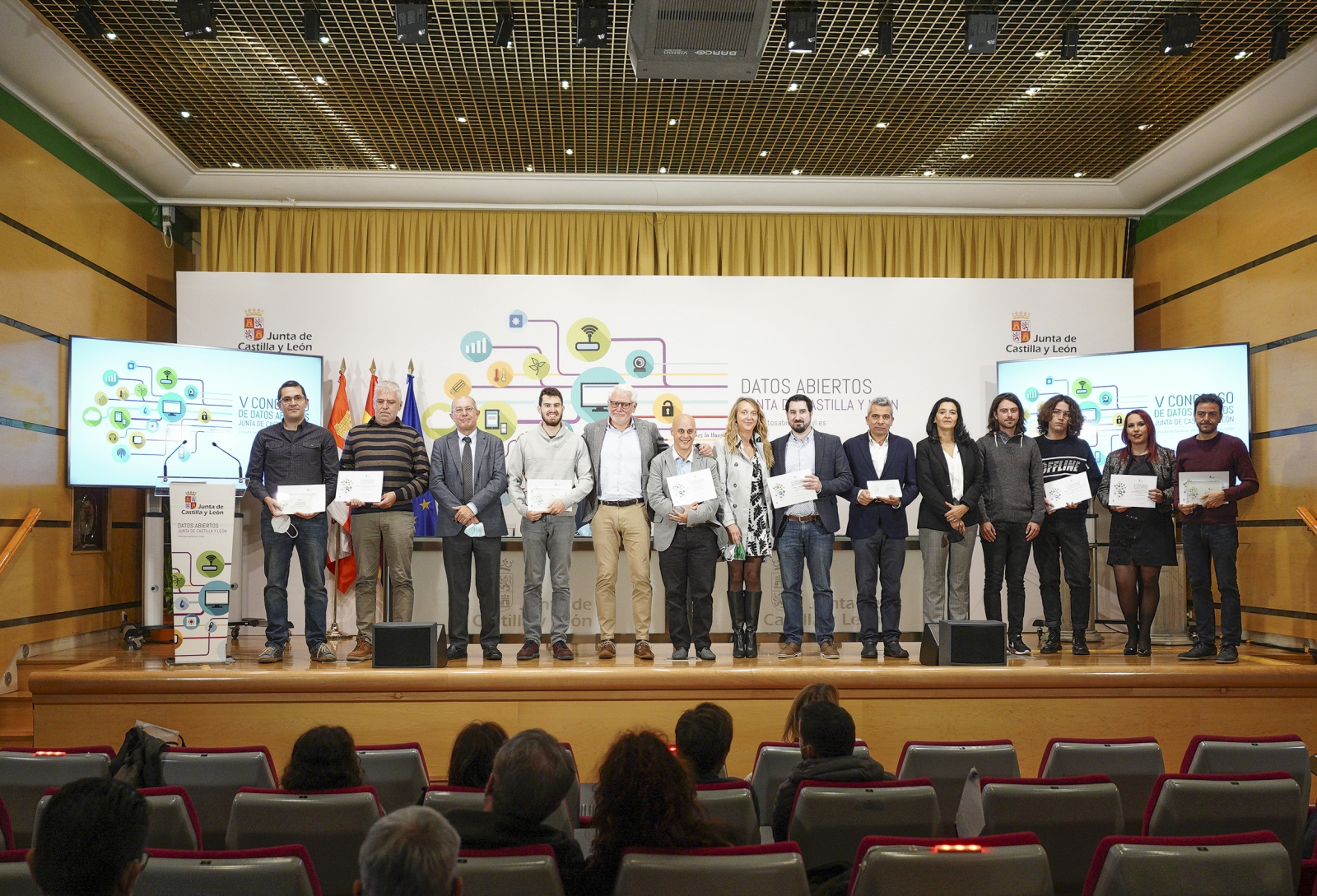
Of the 37 applications received, a jury of experts in the field has chosen 8 projects that have emerged as winners in the various categories.
Category Ideas
In this category, proposals to develop studies, services, websites or applications for mobile devices are awarded.
- The first prize, € 1,500, went to APP SOLAR-CYL, a web tool for optimal sizing of photovoltaic solar self-consumption installations. Aimed at both citizens and energy managers of the Public Administration, the solution seeks to support the analysis of the technical and economic viability of this type of system. The idea was presented by professors from the Electrical Engineering Area, members of the ERESMA (Energy Resources' Smart Management) research group at the University of León: Miguel de Simón Martín, Ana María Díez Suárez, Alberto González Martínez, Álvaro de la Puente Gil and Jorge Blanes Peiró.
- The second prize, € 500, went to Dónde te esperan: Recommender for municipalities in Spain, by Mario Varona Bueno. Thanks to this tool, users will be able to find the best place to live based on their preferences or even chance.
Category Products and Services
This category differs from the previous one in that ideas are no longer awarded, but projects accessible to all citizens via the web through a URL.
- Repuéblame won the first prize, which this time consisted of € 2,500. Presented by Guido García Bernardo and Javier García Bernardo, it consists of a website to rediscover the best places to live or telework. The application catalogs the Castilian-Leon municipalities based on a series of numerical indicators, of its own creation, related to quality of life.
- The second prize, € 1,500, went to Plagrícola: Avisos de Plagas Agrícolas CyL by José María Pérez Ramos. It is a mobile app that informs farmers of the pest alerts published by the Instituto Tecnológico Agrario de Castilla y León (Itacyl), so that they can carry out the necessary preventive and curative measures.
- Complete the podium disCAPACIDAD.es [web], which won the third prize of € 500. Its creator, Luis Hernández Fuentevilla, has developed a website that centralizes offers and aid related to employment for people with disabilities in Castilla y León.
- This category also included a prize for students of €1,500. The winner was Ruta x Ruta x Castilla y León, presented by Adrián Arroyo Calle. This web application allows users to consult routes of all kinds, as well as points of interest located in their vicinity, such as monuments, restaurants or events. The solution also allows users to share their tracks (GPS recordings).
In addition, an honorable mention has been given to the candidatures presented by students "APP BOCYL Boletín Oficial Castilla y León”, by Nicolás Silva Brenes and "COVID CyL" presented by Silvia Pedrón Hermosa. This seeks to encourage students to work with data and present their projects to future calls.
Data Journalism Category
This category is designed to reward relevant journalistic pieces published or updated in any medium, whether written or audiovisual.
- MAPA COVID-19: check how many cases of coronavirus there are and how is the occupation of your hospital from the Maldita Association against misinformation won the first prize of € 1,500. After a work of compiling all the available data that the regional governments publish about the hospitals, Maldita has created a map to see how many cases of coronavirus there are and how the different hospitals are occupied. Information on ICU occupancy is also included in some hospitals.
- The second prize, € 1,000, went to De cero a 48.000 euros: who charges how much in the mayors of Castilla y León. Annual Compensation Explorer. Through various visualizations, its creator, Laura Navarro Soler, reveals information available in the Información Salarial Puestos de la Administración (ISPA). This information is crossed with other types of data such as the number of inhabitants in each region or the level of dedication (exclusive, partial or non-dedicated).
The category "Didactic Resource" has been declared void. The jury considered that the candidatures presented did not meet the criteria set out in the bases.
In total, the 8 awarded projects have received 12,000 euros. They will also have the option of participating in a business development consultancy.
Congratulations to all the winners!
R is one of the programming languages most popular in the world of data science.
It has a programming environment, R-Studio and a set of very flexible and versatile tools for statistical computing and creation of graphical representations.
One of its advantages is that functions can be easily expanded, by installing libraries or defining custom functions. In addition, it is permanently updated, since its wide community of users constantly develops new functions, libraries and updates available for free.
For this reason, R is one of the most demanded languages and there are a large number of resources to learn more about it. Here is a selection based on the recommendations of the experts who collaborate with datos.gob.es and the user communities R-Hispanic and R-Ladies, which bring together a large number of users of this language in our country.
Online courses
On the web we can find numerous online courses that introduce R to new users.
Basic R course
- Taught by: University of Cádiz
- Duration: Not available.
- Language: Spanidh
- Free
Focused on students who are doing a final degree or master's project, the course seeks to provide the basic elements to start working with the R programming language in the field of statistics. It includes knowledge about data structure (vectors, matrices, data frames ...), graphics, functions and programming elements, among others.
Introduction to R
- Taught by: Datacamp
- Duration: 4 hours.
- Language: English
- Free
The course begins with the basics, starting with how to use the console as a calculator and how to assign variables. Next, we cover the creation of vectors in R, how to work with matrices, how to compare factors, and the use of data frames or lists.
Introduction to R
- Taught by: Anáhuac University Network
- Duration: 4 weeks (5-8 hours per week).
- Language: Spanish
- Free and paid mode
Through a practical approach, with this course you will learn to create a work environment for R with R Studio, classify and manipulate data, as well as make graphs. It also provides basic notions of R programming, covering conditionals, loops, and functions.
R Programming Fundamentals
- Taught by: Stanford School of Engineering
- Duration: 6 weeks (2-3 hours per week).
- Language: English
- Free, although the certificate costs.
This course covers an introduction to R, from installation to basic statistical functions. Students learn to work with variable and external data sets, as well as to write functions. In the course you will hear one of the co-creators of the R language, Robert Gentleman.
R programming
- Taught by: Johns Hopkins University
- Duration: 57 hours
- Language: English, with Spanish subtitles.
- Of payment
This course is part of the programs of Data science and Data Science: Basics Using R. It can be taken separately or as part of these programs. With it, you will learn to understand the fundamental concepts of the programming language, to use R's loop functions and debugging tools, or to collect detailed information with R profiler, among other things.
Data Visualization & Dashboarding with R
- Taught by: Johns Hopkins University
- Duration: 4 months (5 hours per week)
- Language: English
- Of payment
Johns Hopkins University also offers this course where students will generate different types of visualizations to explore the data, from simple figures like bar and scatter charts to interactive dashboards. Students will integrate these figures into reproducible research products and share them online.
Introduction to R statistical software
- Taught by: Spanish Association for Quality (AEC)
- Duration: From October 5 to December 3, 2021 (50 hours)
- Language: Spanish
- Of payment
This is an initial practical training in the use of R software for data processing and statistical analysis through the simplest and most common techniques: exploratory analysis and relationship between variables. Among other things, students will acquire the ability to extract valuable information from data through exploratory analysis, regression, and analysis of variance.
Introduction to R programming
- Taught by: Abraham Requena
- Duration: 6 hours
- Language: Spanish
- Paid (by subscription)
Designed to get started in the world of R and learn to program with this language. You will be able to learn the different types of data and objects that are in R, to work with files and to use conditionals, as well as to create functions and handle errors and exceptions.
Programming and data analysis with R
- Taught by: University of Salamanca
- Duration: From October 25, 2021 - April 22, 2022 (80 teaching hours)
- Language: Spanish
- Payment
It starts from a basic level, with information about the first commands and the installation of packages, to continue with the data structures (variables, vectors, factors, etc.), functions, control structures, graphical functions and interactive representations, among others topics. Includes an end-of-course project.
Statistics and R
- Taught by: Harvard University
- Duration: 4 weeks (2-4 hours per week).
- Language: English
- Payment
An introduction to basic statistical concepts and R programming skills required for data analysis in bioscience. Through programming examples in R, the connection between the concepts and the application is established.
For those who want to learn more about matrix algebra, Harvard University also offers online the Introduction to Linear Models and Matrix Algebra course, where the R programming language is used to carry out the analyzes.
Free R course
- Taught by: Afi Escuela
- Duration: 7.5 hours
- Language: Spanish
- Free
This course was taught by Rocío Parrilla, Head of Data Science at Atresmedia, in virtual face-to-face format. The session was recorded and is available through Yotube. It is structured in three classes where the basic elements of R programming are explained, an introduction to data analysis is made and visualization with this language is approached (static visualization, dynamic visualization, maps with R and materials).
R programming for beginners
- Taught by: Keepcoding
- Duration: 12 hours of video content
- Language: Spanish
- Free
It consists of 4 chapters, each of them made up of several short videos. The first "Introduction" deals with the installation. The second, called "first steps in R" explains basic executions, as well as vectors, matrices or data frames, among others. The third deals with the “Flow Program R” and the last one deals with the graphs.
Autonomous online course Introduction to R
- Taught by: University of Murcia
- Duration: 4 weeks (4-7 hours per week)
- Language: Spanish
- Free
It is a practical course aimed at young researchers who need to analyze their work data and seek a methodology that optimizes their effort.
The course is part of a set of R-related courses offered by the University of Murcia, onMultivariate data analysis methods, Preparation of technical-scientific documents and reports or Methods of hypothesis testing and design of experiments, among others.
Online books related to R
If instead of a course, you prefer a manual or documentation that can help you improve your knowledge in a broader way, there are also options, such as those detailed below.
R for Data Professionals. An introduction
- Author: Carlos Gil Bellosta
- Free
The book covers 3 basics in high demand by data professionals: creating high-quality data visualizations, creating dashboards to visualize and analyze data, and creating automated reports. Its aim is that the reader can begin to apply statistical methods (and so-called data science) on their own.
Learning R without dying trying
- Author: Javier Álvarez Liébana
- Free
The objective of this tutorial is to introduce people to programming and statistical analysis in R without the need for prior programming knowledge. Its objective is to understand the basic concepts of R and provide the user with simple tricks and basic autonomy to be able to work with data.
Statistical Learning
- Author: Rubén F. Casal
- Free
It is a document with the notes of the subject of Statistical Learning of the Master in Statistical Techniques. Has been written inR-Markdown using the package bookdown and is available in Github. The book does not deal directly with R, but deals with everything from an introduction to statistical learning, to neural networks, through decision trees or linear models, among others.
Statistical simulation
- Author: Rubén F. Casal and Ricardo Cao
- Free
As in the previous case, this book is the manual of a subject, in this case ofStatistical simulation of the Master in Statistical Techniques. It has also been written inR-Markdown using the package bookdown and is available in the repository Github. After an introduction to simulation, the book addresses the generation of pseudo-random numbers in R, the analysis of simulation results or the simulation of continuous and discrete variables, among others.
Statistics with R
- Author: Joaquín Amat Rodrigo
- Free
It is not a book directly, but a website where you can find various resources and works that can serve as an example when practicing with R. Its author is Joaquín Amat Rodrigo also responsible forMachine Learning with R.
Masters
In addition to courses, it is increasingly common to find master's degrees related to this subject in universities, such as:
Master in Applied Statistics with R / Master in Machine Learning with R
- Taught by: Esucela Máxima Formación
- Duration: 10 months
- Language: Spanish
The Esucela Máxima Formación offers two masters that begin in October 2021 related to R. The Master in Applied Statistics for Data Science with R Software (13th edition) is aimed at professionals who want to develop advanced practical skills to solve real problems related to the analysis, manipulation and graphical representation of data. The Master in Machine Learning with R Software (2nd edition) is focused on working with real-time data to create analytical models and algorithms with supervised, unsupervised and deep learning.
In addition, more and more study centers offer master's degrees or programs related to data science that collect knowledge on R, both general and focused on specific sectors, in their syllabus. Some examples are:
- Master in Data Science, from the Rey Juan Carlos University, which integrates aspects of data engineering (Spark, Hadoop, cloud architectures, data collection and storage) and data analytics (statistical models, data mining, simulation, graph analysis or visualization and communication) .
- Master in Big Data, from the National University of Distance Education (UNED), includes an Introduction to Machine Learning module with R and another of advanced packages with R.
- Master in Big Data and Data Science Applied to Economics, from the National University of Distance Education (UNED), introduces R concepts as one of the most widely used software programs.
- Master Big Data - Business - Analytics, from the Complutense University of Madrid, includes a topic on Data Mining and Predictive Modeling with R.
- Master in Big Data and Data Science applied to Economics and Commerce, also from the Complutense University of Madrid, where R programming is studied, for example, for the design of maps, among others.
- Master in Digital Humanities for a Sustainable World, from the Autonomous University of Madrid, where students will be able to program in Python and R to obtain statistical data from texts (PLN).
- Master in Data Science & Business Analytics, from the University of Castilla-La Mancha, whose objective is to learn and/or deepen in Data Science, Artificial Intelligence and Business Analytics, using R statistical software.
- Expert in Modeling & Data Mining, from the University of Castilla-La Mancha, where as in the previous case also works with R to transform unstructured data into knowledge.
- Master of Big Data Finance, where they talk about Programming for data science / big data or information visualization with R.
- Big Data and Business Intelligence Program, from the University of Deusto, which enables you to perform complete cycles of data analysis (extraction, management, processing (ETL) and visualization).
We hope that some of these courses respond to your needs and you can become an expert in R. If you know of any other course that you want to recommend, leave us a comment or write to us at dinamizacion@datos.gob.es.
The Regional Ministry of Transparency, Territorial Planning and External Action of the Regional Government of Castilla y León has announced this year the fifth edition of the open data competition. The aim of this competition is to recognise the creation of projects for mobile devices that provide ideas, studies, services or applications using the datasets offered by the Junta on its portal.
4 Categories are available
In addition to the traditional categories of "Ideas", "Products and Services" and "Educational Resources", last year "Data Journalism" was added as a novelty. In this fifth edition, these four categories will continue:
- Ideas: this category rewards projects that describe an idea designed to create studies, services, websites or applications for mobile devices.
- Products and Services: this category includes projects that provide studies, services, websites or applications for mobile devices. This category reserves an award for students.
- Teaching Resources: this award is aimed at the creation of new and innovative open teaching resources (published under Creative Commons licences is mandatory) that support classroom teaching.
- Data Journalism: this category, which was new last year, repeats again this year to reward relevant journalistic pieces published or updated in any medium, whether written or audio-visual.
These are the prizes in each category
In each category, a general first and second prize will be awarded, and in the case of "Products and services", one prize will be awarded to students enrolled in official university or non-university education. In the case of minors, a teacher from the school to which they belong will be responsible for the project submitted as a candidature.
The total amount of this fifth edition will be €12,000 and will be distributed as follows:
- Ideas Category
- First prize: 1.500€.
- Second prize: 500€.
- Products and Services Category
- First prize: 2.500€.
- Second prize: 1.500€.
- Third prize: 500€.
- Student prize: 1.500€.
- Educational Resource Category
- First prize: 1.500€.
- Data Journalism Category
- First prize: 1.500€.
- Second prize: 1.000€.
How to participate
The deadline for submitting your proposal is now open. The deadline for submitting applications is 13 July.
Applications can be submitted in two ways: in person or electronically.
You can consult the legal bases of this competition through this link.
Hackathon Lovers is a community of hackathon lovers that holds regular events with a focus on solving technical problems in an innovative way.
In this interview they tell us about the advantages of this format and the challenge of going from face-to-face to online format.
Full interview:
1. Can you briefly explain what Hackathon Lovers is?
Hackathon Lovers is a technology company that organizes its own hackathons and helps other companies organize their own as long as they comply with non-abusive conditions for the participants that we have included in our ethical code (https://hackathonlovers.com/#principios).
2. What are the advantages of hackathons compared to other types of events?
Perhaps the biggest advantage is that with the solutions that are developed we can help solve real problems.
More bonds are created between the participants than in other events since you are working with them side by side for a couple of days without stopping and above all you learn a lot from your colleagues.
For the participants who are very juniors, they are a place where they can put into practice the knowledge they have, learn from those who already have more experience, make new contacts and, above all, who come out with projects that they can teach to find work.
3. One objective of this type of event is to address certain challenges that can be solved using public data. Would you like to highlight, by way of example, any of these and briefly comment on what kind of solutions the participants propose?
The use of public data in hackathons is quite common, since that public data can be used in conjunction with other APIs to develop better products than without that data.
For example, at #Hack4Good the map of the evolution of air pollution in Madrid was developed. At #DataFestMAD, a team developed an application that showed the optimal route between two points avoiding the pollution areas, and at #TWOC15 , the winning team developed an application that shows the reputation of places (neighborhoods) based on open data on crime, facilities and infrastructures.
The use of public data in hackathons is quite common, since that public data can be used in conjunction with other APIs to develop better products than without that data.
4. What kind of profiles come to your meetings?
This question depends on the challenge the hackathon is addressing. Normally the people who attend are from the technology sector and within this we can find profiles of web development, design, data analysis, blockchain ... Although we have also organized other types of hackathons in which people from the health sector (#Searchathon), legal (#JustiApps) and renewable energy (#Renovathon) have participated, among others because the challenge was more focused on these sectors .
5. What advice would you give to those who want to participate in a hackathon?
Let them sign up without fear. To participate in a hackathon you don't have to be a supercrack. The idea is to get together with other people with more / less level and work side by side to come up with a solution to the problem that arises, meet people from the sector or from other sectors, have a good time and learn.
6. The restrictions caused by the pandemic have been a challenge for you, how have you dealt with it?
A little because we have had to change and rethink the dynamics of a hackathon to adapt it to the online environment by using different platforms for communication during the hackathon. So we had to find which tools provided us with the functionalities we needed and at the same time that they were easy for the participants to use, and we even had to do some small development to facilitate our work.
7. What types of open data have you used in your projects and what data would you like to work with?
At the #OpenApiHackathon on Open Banking organized by Liberbank and atmira, Liberbank made available to the participants its catalog of Open Banking APIs developed following the technical guides of Directive 2015/2366 on payment services in the internal market, PSD2, standard community that obliges financial entities to share their data.
The API catalog dealt with Payments, Oauth Provider, Accounts, PSD2 Registration, and there were two work environments, a first using a Sandbox development environment and later a second step to Pro.
8. Finally, how can interested people follow Hackathon Lovers and collaborate with you?
You can follow us on twitter and join our meetup, where we have a mailing list in which we announce both the hackathons that we organize and those that we see that comply with our code of ethics.
As every year, the GBIF Secretariat, on behalf of the network of National Participants (including Spain), has opened the call for applications for the Young Investigator Award 2021.
This call is aimed at graduate students who wish to work with GBIF biodiversity data in their master's or doctoral studies. The main objective is to recognize and encourage innovative research and discoveries in the field of biodiversity informatics by graduate students.
This year the program will award two prizes of €5,000 each. This financial endowment will be used to recognize the work of two early career researchers, preferably one master's and one doctoral student.
Eligibility Criteria
All candidates enrolled in the program must be enrolled in a graduate degree program to be eligible for the Young Researchers 2021 award. In addition, candidates must be from one of the countries participating in GBIF or be a student at an institution located in one of these nations.
Students must be nominated by the heads of delegation and node directors of the GBIF participating countries.
Registration deadlines by country for 2021
Although the deadline set by the GBIF Secretariat for the receipt of nominations is June 21, the deadlines of each nation must be applied. In the case of Spain, the date is May 31.
- May 30: United Kingdom
- May 31: Argentina, Australia, Colombia, Spain and the United States.
The new deadlines for each country will be published on the call page, although you can also follow the news about new dates on the GBIF Twitter account through the hashtag #YoungResearchers.
Application submission process
Students who wish to participate must submit an application to the Head of Delegation or node administrator of their country as a GBIF Associate or Voting Participant (you can consult the complete list here), which will be reviewed at the national level. In the case of Spain, you must submit your proposal to info@gbif.es.
Then, each national head of delegation or node administrator will be able to send a maximum of two nominees per country to the GBIF Secretariat.
It is important to ensure that submissions are complete and include all the necessary elements listed on this website, as incomplete proposal submissions will not be considered.
Winner selection criteria
The GBIF Scientific Committee will ultimately analyse the nominations that have been submitted to select the final winners of the awards. This selection will be made on the basis of three criteria:
- Innovation and originality
- Strategic use and significance of data accessed through GBIF
- Effectiveness and measurable impact on the advancement of biodiversity informatics and biodiversity conservation.
If your proposal is not selected, the program offers the possibility of updating it and resubmitting it in subsequent years' competitions.
What is GBIF?
GBIF is an intergovernmental initiative composed of countries and international organizations that are committed to collaborate in advancing free and open access to biodiversity data. Through its nodes, participating countries provide data on species records based on common standards and open source tools that allow them to share information. These data come from many sources, from specimens held in museums and collected in the 18th and 19th centuries to geotagged photos taken with smartphones and shared by amateur naturalists.
It currently has more than 1.6 billion records and 57,000 datasets of great utility for researchers conducting studies related to biodiversity and the general public.
GBIF-ES is the National Biodiversity Information Node sponsored by the Spanish Ministry of Science and Innovation and managed by the Spanish National Research Council (CSIC). The creation of this node was a consequence of the adhesion of our country to GBIF through the signing of the first "Memorandum of Understanding
The year 2020 closed with the announcement of the winning projects of two competitions that sought to promote the reuse of open data in two Autonomous Communities: Castilla y León and Euskadi.
Winning projects of the 4th Castilla y León Government Open Data Competition
As in other years, the latest edition of the Junta de Castilla y León's open data competition was aimed at supporting and recognising projects that provide any type of idea, study, service, website or application for mobile devices, using the datasets of the Junta de Castilla y León's Open Data Portal.
A total of eight projects were awarded, divided into different categories as follows:
Ideas category
This category is aimed at those participants who have a great idea even though they do not have the technical capacity, time or resources to implement it.
- The first prize was awarded to Cristina Pérez Fernández and César González Palomo. Their project Castilla y León en remotely presents a search engine for "the ideal population" for those professionals who work remotely and wish to move to a place that will help them to satisfy their desire for a change in lifestyle. Based on the personal preferences of each user, the search engine offers the possibilities that best suit their needs and desires. To do so, it exploits data such as the availability of 4G and/or fibre optic coverage, number of inhabitants in the "ideal population", distance to places of interest, cultural activity, natural environment or average rent/purchase price per square metre.
- The second prize went to Juan Carlos Solís Méndez for his CyL Mobility project. They have put their idea into practice through a first version of a website that brings together all the information collected on the establishments in the autonomous community that are adapted for people with reduced mobility. This is, without a doubt, an idea with a clear social value as it favours the improvement of the quality of life of a vulnerable group.
Products and services category
In this category, they were looking for projects that provided studies, services, websites or applications for mobile devices, that used datasets from the Junta de Castilla y León's Open Data Portal and that were accessible to all citizens via the web by means of a URL.
- The first prize went to the Escovid19data project, a collaborative collection of visualisations and reusable data from COVID-19 by regions in Spain. This project helps to improve the data and information published by the Administration and encourages citizens to become more aware of the serious problem we face.
- The second prize went to the Castilla y León Gurú project, an assistant based on a conversational bot in Telegram that offers users tourist, cultural and leisure information on the community.
- The student award went to TurisCyL, an app for Android mobiles that serves as a travel guide for the autonomous community by offering as much information as possible about tourist sites (restaurants, accommodation, etc.), as well as museums or cultural events.
Didactic Resource Category
Within this section, the creation of innovative open educational resources (with Creative Commons licenses), which support teaching, is encouraged.
- The prize in this category went to the Casual Learn project, an application for Android mobile devices that allows people to learn about art history from buildings and public spaces in Castilla y León. The app suggests learning tasks considering the interests and location of the user. For example, if the user passes near a Gothic church, Casual Learn can suggest taking a photo of its facade and comparing it with that of a nearby Romanesque church.
Data Journalism Category
This category rewards relevant journalistic pieces published or updated in any medium, whether written or audiovisual.
- The first prize in this section went to Coverage of coronavirus diagnostic tests in Spain, a collection of data and reports on the lack of resources and transparency in carrying out diagnostic tests for the COVID-19.
- The second prize went to This is how the coronavirus has affected residences in Castilla y León, an extensive journalistic article on the situation experienced in the residences of Castilla y León at the beginning of the pandemic.
Winners of the Basque Country 2020 Open Data Ideas and Applications Competition
Another of the challenges resolved at the end of the year were the Basque Country Open Data Ideas and Applications competitions, with the aim of publicising and promoting the reuse of open data in the region, organised by the Basque Government together with the Provincial Councils of Alava, Bizkaia and Gipuzkoa and the City Councils of Bilbao, Donostia-San Sebastian and Vitoria-Gasteiz.
Winning projects of the Basque Country Open Data Ideas Competition 2020
The Ideas Competition is aimed at both individuals and companies who wish to submit "ideas for creating products or services derived from open data from the main public data catalogues in the Basque Country". The third edition admitted 30 candidatures, of which two were awarded prizes:
- The first prize in this category went to the Basque Country Seasonal Pollen Forecasting Service project, by Ortzi Torices Roldán and Hodei Goncalves Barkaiztegi. This is a proposal to create a neuronal network to forecast pollen levels in the Basque Country and to offer a public service for people suffering from allergies and respiratory conditions.
- The second prize was awarded to the Ongi etorri Euskal Herrira project, by Iker Díez Arancibia and Alberto Nieto de Pablos. This project proposes an application based on the generation of plans that bring together the types of activities desired by each tourist in a limited geographical area. It offers tourists a graphic representation of the different plans they request and allows for the joint booking of the activities that make up the plan.
Winning projects of the Basque Country Open Data Applications Competition 2020
For its part, the Applications Competition is aimed at both individuals and companies that have created or wish to create "products or services derived from open data from the main public data catalogues in the Basque Country". Of the 28 candidatures admitted, the following have been awarded prizes:
- The first prize was awarded to Smart Public Tender, by Manuel José García Rodríguez, a web platform that includes the latest innovations in the field of public procurement and which helps both public administrations and tendering companies in their decision-making using Machine Learning methodology.
- The second prize was awarded to AvatarParking, by Unai Antero Urruticoechea and Beatriz Arenal Redondo. It is an application that is designed as an assistant for car parks in San Sebastian. By accessing the user's location in real time, it indicates the nearest car park, the number of free spaces available, possible incidents on the way, as well as an estimate of the cost of leaving the car there. The application is designed to be actively carried on the mobile phone and to receive information and commands by voice, thus avoiding distractions with the mobile phone while driving.
Congratulations to all the winners!
Many open data initiatives have taken advantage of the end of the summer and the return to school to launch competitions to promote the creation of value services based on open data. In addition to the recent launch of the Aporta 2020 Challenge, which on this occasion focuses on solving the challenges associated with the education sector, new editions of competitions such as BiscayAPP, the Barcelona Dades Obertes Challenge and the Castilla y León Open Data Competition have just closed their registration period.
The latest to join the list is the Basque Government, which together with the Provincial Councils of Alava, Bizkaia and Gipuzkoa and the City Councils of Bilbao, Donostia-San Sebastián and Vitoria-Gasteiz, has just launched two open data competitions, which aim to reward the best ideas and applications/services created from any open data catalogue in the Basque Autonomous Community.
- Ideas Contest: The Ideas Contest is aimed at both individuals and companies. They only have to present an original idea that can be used to create a service, studio, visualization, web or mobile application.
- Applications Contest: The Applications Contest is aimed at individuals and companies that, individually or in groups, present a project that is accessible to all citizens via the web.
In both cases, the idea or project must be based on the use of at least one set of data from one of the following catalogues:
- Open Data Euskadi
- Araba Irekia
- Gipuzkoa Irekia
- Bilbao Open Data
- Open Data Vitoria-Gasteiz
- Datos abiertos del Ayuntamiento de Donostia-San Sebastián
- Open Data Bizkaia
Two winners will be chosen, who will receive a diploma and a prize of 5,000 and 3,000 euros in the case of the Ideas Competition and 10,000 and 8,000 euros in the case of the Applications Competition.
Registration is free and will be open from 8 October to 19 November, both inclusive.
More information at Open Data Euskadi
